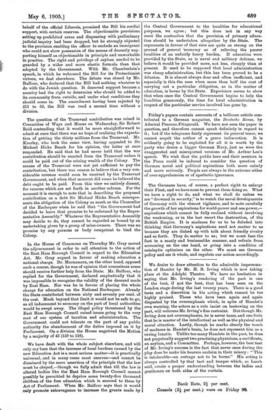We have dealt with the whole subject elsewhere, and will
only say here that the increase of local burdens caused by the new Education Act is a most serious matter—it is practically universal, and in many cases most onerous—and cannot be dismissed by the mere assertion of the principle that the law mutt be obeyed,—though we fully admit that till the law is altered bodies like the East Ham Borough Council cannot possibly be permitted to deprive some twenty-five thousand children of the free education which is secured to them by Act'of Parliament. When Mr. Balfour says that it would only promote extravagance to increase the grants made by the Central Government to the localities for educational purposes, we agree ; but this does' not in any way meet the contention that the provision of primary educa- tion should be undertaken altogether by the State. The arguments in favour of that view are quite as strong on the ground of general "Cconomy as of relieving the poorer localities of an unfairly heavy burden. If education were provided by the State, as is naval and military defence, we believe it would be provided more, not less, cheaply than at present. It used to be supposed that local administration was cheap administration, but this has been proved to be a delusion. It is almost always dear and often inefficient, and especially is this the case when more than half the cost of carrying out a particular obligation, as in the matter of education, is borne by the State. Experience seems to show that when once the Central Government begins to help the localities generously, the time for local administration in respect of the particular service involved has gone by.










































 Previous page
Previous page